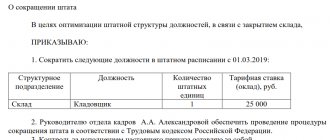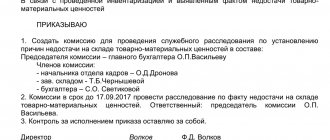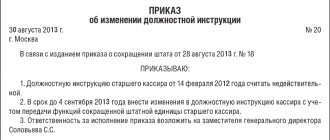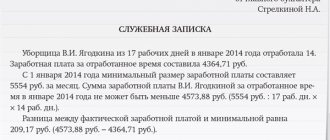The regulation on employee certification - a sample of it will be presented in our article - is approved by any company that plans to test its employees for professional suitability. The regulations are drawn up for the enterprise as a whole, without dividing employees into management, maintenance or other personnel. You will learn more about the procedure for drawing up and approving this local document below.
https://youtu.be/p0U7ovIzwo0
Is it necessary to approve the regulations on the procedure for certification of employees?
Is there a need for an order to approve the regulations on employee certification?
Structure of the certification provision
Important points in applying the certification provision
Results
Is it necessary to approve the regulations on the procedure for certification of employees?
In most private companies, employee performance reviews are not a requirement. An exception to the general rule are public sector employees (teachers, doctors) and other specialists who, in accordance with regulations, must periodically undergo certification activities.
The basis for certification for many private employers are:
- carrying out personnel rotations in the company in the form of promotion/demotion of employees;
- dismissals of incompetent employees;
- assessment of the level of professional training of personnel in order to determine the need for additional training and advanced training;
- creating additional incentives for the professional growth of employees at the enterprise;
- formation of a personnel reserve from among the most competent specialists.
Purpose of certification
Such a test is a kind of exam that makes it possible to evaluate the general professional training of an employee working in an organization. If, based on the certification carried out, it becomes clear that a person does not correspond to the assigned position, he must be transferred to another workplace - Article 261 of the Labor Code. If there is no alternative in terms of the position held, the employee may be dismissed - Article 81 of the Labor Code.
Important ! The incompetence and unprofessionalism of an employee can become a direct basis for the employer to terminate the contract.
The goals of organizing and conducting an audit are not always so categorical. This is an excellent way to conduct the required testing and timely take the required measures aimed at eliminating problems and shortcomings.
In addition, periodic certification is a stimulating procedure for the employee himself. There is a desire to improve skills and undergo training. Thanks to this, labor productivity increases and the overall prospects of the enterprise expand.
Is there a need for an order to approve the regulations on employee certification?
After developing and agreeing on the content of all necessary sections, the regulation must be approved by the head of the company. There are two options for approving the certification regulations:
- issuance of an order approving the regulation along with all annexes (if any);
- affixing a signature on the position itself next to the “I approve” stamp (indicating the date).
In this case, it does not matter how the provision was approved, the main thing is that it is signed by a person authorized to carry out this operation. Thus, dismissal based on the results of certification may be considered illegal if the regulation on the procedure for conducting certification was signed by an unauthorized person (appeal ruling of the court of the Chukotka Autonomous Okrug dated October 27, 2014 in case No. 33-173/14).
Who is and is not assessed?
The procedure, as well as the categories to be assessed, are approved by the Regulations on Certification for the enterprise. And since the certification procedure for commercial companies is not regulated by law, designated institutions prefer to use general principles developed for other industries.
So, for example, by virtue of Article 18 of Federal Law No. 25, the following categories of employees are not subject to periodic recertification:
- pregnant employees;
- women on maternity leave, as well as women within a year after the end of their labor leave or child care;
- employees hired on a fixed-term contract basis for a period not exceeding a year;
- employees who are classified as newly hired and employed in the institution for no more than 12 months;
- persons who have reached retirement age;
- employees appointed by higher-level organizations, which is important for management personnel.
Structure of the certification provision
There is no single form of regulation that would describe the procedure and rules for conducting certification. But many employers prefer to draw up their own regulations using the norms prescribed in the resolution of the State Committee for Science and Technology of the USSR No. 470 and the State Committee for Labor of the USSR No. 267 dated 10/05/1973, to the extent that does not contradict modern labor legislation.
In accordance with this regulatory act, the regulations on certification at the enterprise must display the following data:
- the purpose and objectives of the certification;
- categories of employees who must undergo certification, as well as those who are not subject to qualification testing;
- timing of certification with mandatory approval of the schedule;
- procedure for certification and composition of the commission;
- circle of persons responsible for preparing all necessary documents;
- criteria for evaluation;
- summarizing the certification results (timing and description of the procedure).
The enterprise adopts one regulation on certification, in accordance with which the business qualities and qualifications of both management personnel, engineers, and all other employees will be checked. To take into account certain nuances, for example, in the procedure for certifying managers, it will be enough to reflect this norm for this category of employees in the general regulations.
It should be borne in mind that when developing regulations, the opinion of the representative body of the enterprise’s employees must be taken into account (Part 2 of Article 81 of the Labor Code).
Now let’s look at each of the subsections of the certification regulations in detail:
- Goals and objectives. This section of the local act mentions all the purposes for which an enterprise can initiate certification. So it could be written:
- introduction of a reward system at the enterprise;
- identifying the need for advanced training;
- determination of an insufficient level of qualifications for the purpose of subsequent dismissal for non-compliance of qualifications with those specified in the job description, or promotion of successfully certified employees to positions.
You can learn about the procedure for approving job descriptions from our article “Order on approving job descriptions - sample.”
- Categories of employees. This section should indicate which categories of employees and with what frequency must undergo certification. It is also necessary to highlight the circle of persons who should not undergo certification:
- pregnant women;
- scientific workers who have been working at the enterprise for less than 2 years;
- new employees who have been in their position for less than a year;
- young specialists employed immediately after graduation during their mandatory period of service;
- women with children under one year old;
- unskilled workers who work in cultural institutions;
- others specified in clause 4.1 of the FMS order No. 115 dated 04/02/2012, in clause 1.2 of the Pension Fund Board resolution No. 5p dated 01/15/2007, clause 2 of the Ministry of Education and Science order No. 276 dated 04/07/2014.
- Terms and schedule of certification. Depending on the purposes of the certification and the category of employees being certified, different deadlines are established. So, there is certification:
- planned (carried out on a regular basis - once every 3–5 years, every year/six months, etc.);
- unscheduled (carried out only when the need arises, for example in the case of manufacturing a defective batch of products);
- for employees who for some reason could not be certified along with everyone else, for example, were on sick leave or on parental leave.
- When establishing the procedure for conducting certification, it will be important to determine the form of conducting this event. The following certification formats are distinguished:
- written (filling out questionnaires or tests);
- oral (usually an interview);
- mixed, for example, interviews and questionnaires.
The certification schedule must contain specific dates for testing for various categories of employees or for employees who work in certain structural divisions of the company. The schedule is usually attached to the position as an addendum - employees are also familiarized with it upon signature.
The process of forming the composition of the commission for certification (chairman, secretary, members, trade union representative, expert, etc.) highlighting the functions of each of its members is also an important stage in preparation for certification. The description in the order position is significant:
- notifications to employees about certification;
- maintaining a protocol (with a mandatory indication that this procedure is mandatory), you will also need to develop and attach a form for such a protocol;
- conducting voting (open, closed);
- identifying the person responsible for preparing and providing all necessary materials and documents;
- designating the stages of certification (creating a register of those being certified, informing management about the submission of characteristics of their subordinates who will be certified).
In most companies, it is customary to develop certain forms of documents in addition to the regulations (attestation sheet, protocol of the certification commission, etc.).
Sample order
When composing a document, you should adhere to a certain structure. The following items should be completed sequentially:
- At the beginning of the line, in the middle, you need to write down the official name of the company.
- Next, write the word “Order” and the number assigned to it.
- The locality where the enterprise is registered is registered.
- Date of preparation of the paper.
- The essence of the order is written. This section should indicate the purpose of organizing the certification and the date of the event. Here you need to list the employees who are planned to be certified. If there is a lot of citizen data, they are written out on a separate sheet. It is attached to the order.
- Next, the composition of the inspection commission is specified - full name and position. Responsible persons such as secretary and chairman are identified.
- A person is registered who will explain the procedure. Usually this is a personnel officer or an official deputy director for the working team.
- An employee responsible for the precise implementation of the order is identified and recorded.
- At the end, the signature of the chief appointed as members of the commission is affixed.
After completing the documents and the necessary order, the scheduled certification inspection is carried out at the appropriate time.
order for certification of suitability for the position held.
Important points in applying the certification provision
Labor disputes between an employer and a dismissed employee often arise during dismissal based on the results of certification (clause 3, part 1, article 81 of the Labor Code). To avoid such a development of events and protect its legal position, the employer is obliged to develop and approve a regulation on certification before conducting the very first certification in the company.
You will find more information about dismissal in our article “The procedure for dismissing an employee at the initiative of the employer.”
It is important not to forget to familiarize all employees with the text of the approved certification regulations. In this case, it will not be enough for the employee to familiarize himself only with the order approving the position.
When developing certification regulations, it is important to clearly state the assessment criteria that will be used to test the business qualities and qualifications of employees. If this is not done, the employer may lose the labor dispute (appeal ruling of the Smolensk Regional Court dated February 24, 2015 in case No. 33-631/2015).
In preparation for certification, the employer must carry out the necessary explanatory work in order to inform employees in as much detail as possible about the purpose of certification, its form and evaluation system (appeal ruling of the Moscow City Court dated February 24, 2015 in case No. 33-639/15).
In the event of a labor dispute related to challenging the decisions of the head of the company made based on the results of certification, it is necessary to provide to the court evidence that the employee was provided with all the necessary information - the employee was informed that his business qualities can be assessed in the format carrying out certification and that if unsatisfactory results are obtained, he may be dismissed (determination of the RF Armed Forces dated June 4, 2004 No. 5-B03-82).
At the same time, an employee cannot refuse to undergo certification if his position falls under the category of those being certified and if he was familiarized with the regulations on certification and notified of the timing and schedule of its implementation (decision of the Moscow Regional Court dated June 10, 2010 in case No. 33-11194).
Normative base
The labor legislation of the Russian Federation does not oblige compulsory certification at enterprises, and therefore this procedure is used in a number of companies only occasionally, and only at the request of management in special situations, which is fundamentally wrong.
After all, many employers use certification as a tool designed to weed out unwanted employees on completely legal grounds within the framework of Part 3 of Article 81 of the Labor Code of the Russian Federation.
Meanwhile, if a decision is made to introduce a certification procedure, it should be regular and carried out not nominally, but in accordance with the rules approved by the company’s local regulations. They must include several orders, as well as a Regulation prescribing all the steps and approving the same certification sheet, and a number of other documents.
However, the rule on optional employee certification applies only to commercial establishments. For organizations that are government agencies and also operate in some special areas, the frequency of employee certification is determined by the law.
Thus, the following are required to undergo the certification procedure:
- teachers within the framework of Article 49 of the Federal Law of December 29, 2012 N 273-FZ;
- cultural workers by virtue of Letter of the Ministry of Culture of the Russian Federation dated 02/08/2010 N 7790-44_04-ПХ;
- state and municipal employees in accordance with Article 48 of the Federal Law of July 27, 2004 N 79-FZ, Article 18 of the Federal Law of March 2, 2007 N 25-FZ;
- management of unitary enterprises;
- military personnel under contract in accordance with the norms of Article 26 of Decree No. 1237;
- doctors in accordance with Article 72 of Federal Law of November 21, 2011 N 323-FZ.
Results
If an enterprise plans to test the qualifications and business qualities of employees, it must develop its own certification regulations. The preparation and development of this local act must be approached very responsibly - it is important that the certification procedure and its stages are described in detail.
Each employee of the enterprise will need to be familiarized with the text of the approved regulations on certification against receipt, and when preparing to undergo a qualification test, each person will also be personally notified of the schedule for its implementation.
Based on the results of the certification, the manager makes a personnel decision for each of the employees who took part in the qualification test or refused it.
It should be borne in mind that these results (in most cases, dismissal) can be challenged in court. You can find more complete information on the topic in ConsultantPlus. Full and free access to the system for 2 days.
Reasons
Certification is not a procedure that can be performed at any time at the discretion of management. Quite the contrary, for the implementation of measures to evaluate staff members, good reasons are needed.
They may be:
- norms of law, which establish frequency, for example, every three years for civil servants;
- schedule approved by local acts;
- the upcoming staff reduction, which requires employee evaluation to further select the best;
- changing the amount of payment, for example, confirmation of the premium in the same amount;
- admission of significant violations in the performance of immediate duties.










